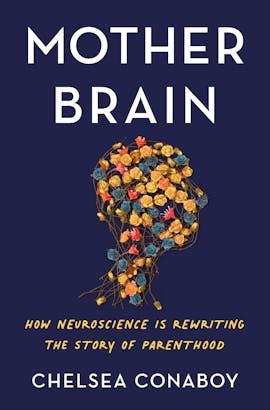Chelsea Conaboy is a health and science journalist. She translates complicated research for a general audience and weaves it together with compelling stories. Conaboy provides cultural context to show what research means for our individual experiences and for society as a whole. She was part of the Boston Globe’s Pulitzer prize-winning staff for coverage of the Boston Marathon bombing. Publications such as The New York Times, The Guardian and Mother Jones have featured her work. Politico, The Week, the Boston Globe Magazine, WBUR, and The Philadelphia Inquirer have also featured her work. She writes a Substack newsletter on parenthood and storytelling, called Between Us.
The writing of Mother Brain: How Neuroscience Is Rewriting the Story of Parenthood, her first book, was supported with a generous grant from the Alfred P. Sloan Foundation Program for the Public Understanding of Science, Technology and Economics. Critics hail the book as “a game-changer” and describe it as “a generous, engaging, deeply researched book that will change the way you think about your own parents, your children, and yourself.”
Chelsea Conaboy is an experienced speaker and frequent podcast guest. She has presented on the parental brain science and related topics to researchers, clinicians, health care executives, parents, readers and staff of the White House. She lives in Maine with her husband, their two children, and her own changing maternal brain.
Download Bio
 Hardcover
|
Health and science journalist Chelsea Conaboy explodes the concept of “maternal instinct” and tells a new story about what it means to become a parent. Conaboy expected things to change with the birth of her child. What she didn’t expect was how different she would feel. But she would soon discover what was behind this: her changing brain. Though Conaboy was prepared for the endless dirty diapers, the sleepless nights, and the joy of holding her newborn, she did not anticipate this shift in self, as deep as it was disorienting. Mother Brain is a groundbreaking exploration of the parental brain that untangles insidious myths from complicated realities. |
Maternal Instinct: Its Pernicious Past and Present The idea of maternal instinct as an innate and automatic capacity for caregiving, and one that is distinctly female, is not based in science but in belief. It comes from religious notions about womanhood that were written into scientific theory in the late 19th and early 20th century. From the start, the notion of maternal instinct was a means of social control favored by eugenicists for compelling the “fittest” mothers to embrace their role in advancing the racial state. Today, it continues to shape our expectations of mothers, the clinical care and social policies meant to support them, and the broader conversation about parenthood.
“That’s Normal” Worried and anxious as a new parent? That’s normal. Not “bouncing back”? Normal. Feeling different—in ways you can’t quite describe? Pretty normal. Needing way more time and support than you expected to adjust to parenthood? Very, very normal. This talk looks at how our expectations of new parenthood and the reality of it so often don’t match, because the cultural stories we tell so often are wrong. We can use our own experiences and the emerging science of the parental brain to write a different story.
Making Room for Parenthood: How the Parental Brain Science Could Reshape Social Policies, Clinical Care and the Cultural Conversation Around What it Means to Become a Parent Over the past 15 years or so, the science of the teenage brain has been used to change school start times, public health messaging around substance use and risky behaviors, and disciplinary practices. It’s been used to help teenagers (and their families) understand themselves and the life stage they’re going through. The parental brain research could be used for a similar set of campaigns, big and small—to reshape prenatal and postpartum care, to overhaul social norms that dictate policymaking affecting all caregivers, and to change the conversation we have with one another about what it means to become a parent.
The Guardian, The Big Idea: Why the Maternal Instinct is a Myth
Next Big Idea Club, Mother Brain: How Neuroscience Is Rewriting The Story of Parenthood
Insider, Parallels Between Parenthood and Musical Training
NPR Interview, The Labor Of Love
Vox Podcasts, Expecting: Baby brain
NPR, Comic on Chelsea Conaboy, Instagram
- Anu Sharma, Founder and CEO, Millie, Inc.
“Chelsea Conaboy is a compendium of knowledge on the vitally important yet neglected topics of women’s health and the parental brain. Her presentations are eye-opening for clinicians as well as parents themselves. Our audience did not want to leave and kept the event going well past the scheduled ending time!”
- Ananda Lowe, Director of Boston Doula Circle
"We valued having Ms. Conaboy come to Teachers College, Columbia University to speak on the history and developmental neuroscience of the transition to motherhood. The topic was well received by students across campus and the general public, both in person and online, resulting in one of the more popular book talks yet. Ms. Conaboy is able to translate dense material for a general audience using a compelling narrative style while still remaining grounded in the science. She has a clear command of factual information and deftly weaves it with her personal, lived experience. Taken together, her objective and subjective voice is sure to engage any audience she speaks to!"
- Aurélie Athan, Co-Founder of The Reproductive Psychology Lab in the Department of Counseling & Clinical Psychology at Teachers College

